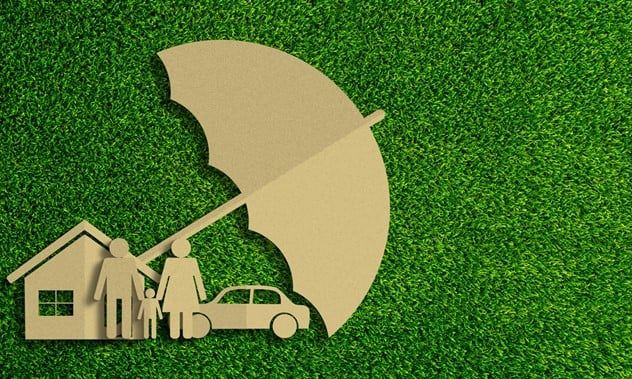Insurance policies are designed to protect you from financial loss, but standard policies generally have limits. When accidents, lawsuits, or unexpected claims exceed your coverage, an umbrella policy can provide an extra layer of protection. Whether you’re a homeowner, business owner, or a high net-worth individual, an umbrella policy helps safeguard your assets from costly legal and liability claims.
What is an umbrella policy?
An umbrella policy is a type of liability insurance that extends beyond the coverage limits of your primary policies, such as home, auto, or renters’ insurance. It acts as an added safety net, stepping in when your existing liability coverage in a certain category is exhausted.
For example, if you were found at fault for a car accident that results in $500,000 in damages, and your standard auto policy only covers up to $300,000, an umbrella policy could cover the remaining $200,000 instead of forcing you to pay out of pocket.
What coverage does an umbrella policy offer?
Umbrella insurance primarily provides additional liability coverage in the following categories:
- Bodily injury liability – covers medical expenses and legal fees if someone is injured on your property due to an accident you caused.
- Property damage liability – pays for damages to others property that exceed your primary insurance limits.
- Legal defense costs – helps cover attorney fees, court costs, and settlements if you’re sued.
- Personal liability claims – protects against defamation, libel, slander, false arrest, and invasion of privacy claims.
- Landlord liability – covers rental property owners from lawsuits filed by tenants or guests.
Another key benefit of umbrella insurance is that it provides worldwide coverage, unlike standard policies that may only apply in specific locations.
Who needs an umbrella policy?
While umbrella policies can benefit anyone, the coverage is especially useful for individuals:
- With significant assets.
- Who engage in high-risk activities.
- Have new teen drivers in the house.
- Own rental properties.
- Have high public visibility.
Each of these circumstances would both put you at a higher risk of damage and leave you on the hook for more significant costs should an incident occur, making the added coverage that an umbrella policy offers vital.
When would you need an umbrella policy?
You might need umbrella coverage in situations like:
- A guest is seriously injured in your home, and their medical costs exceed our homeowners insurance limits.
- You are sued for defamation after making a statement on social media.
- Your dog bites someone, leading to legal action.
- A major car accident results in monetary damages beyond what your auto insurance limits cover.
- A tenant sues you for an injury sustained on your rental property that you are found at fault for.
In these cases (and many others), an umbrella policy prevents you from paying excessive out of pocket costs, protecting both your financial goals and restoring peace of mind.
How can you find the umbrella policy that’s right for you?
If you are in a position to benefit from the enhanced protection that umbrella coverage provides, the next step is determining the exact package you need to ensure that you have coverage that is tailored to your specific needs. These next steps include:
- Assess your risk – determine how much extra liability protection you may need based on your total assets, your lifestyle, and potential risks you are exposed to.
- Check your current coverage – review your existing auto, home, or renters’ policies to understand their liability limits.
- Choose coverage amount – umbrella policies typically start at $1 million in coverage, with higher limits available if needed.
- Compare insurance providers – many insurers offer umbrella policies, but not all providers are created equal. It’s important to find a provider you trust, and that you know will be there for you when the time comes.
- Meet underlying policy requirements – most umbrella insurers require you to maintain a minimum level of liability coverage on your primary policies before they can offer additional protection in excess of these limits. Be sure to discuss these matters up-front with your insurance agent to ensure there are no surprises down the line.
Optimal protection for your family in your hometown
Finding an independent insurance agent in your community to discuss an umbrella policy with is as easy as making a phone call.
Set up a meeting with one of our helpful agents on the insurance team at Minnwest Insurance Agency. We’re located in hometowns throughout Minnesota and southeastern South Dakota. As independent agents, we can compare rates from numerous insurance companies, so you can get the best coverage at the best value.
Minnwest Insurance Agency, Inc is an affiliate of Minnwest Bank. Products offered through Minnwest Insurance Agency, Inc are: Not a deposit | Not FDIC insured | Not insured by any federal government agency | Not guaranteed by the bank or an affiliate of the bank | May go down in value (if applicable)


